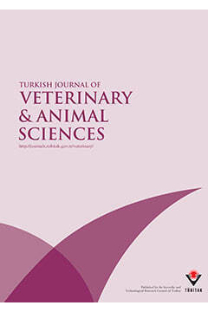Investigations of Serratia liquefaciens Infection in Rainbow Trout (Oncorhynchus mykiss Walbaum)
This study was conducted to investigate Serratia liquefaciens infection in juvenile cultured rainbow trout (Oncorhynchus mykiss Walbaum) during June and July in 1996 about 20 days after flooding in three farms in Erzurum. Bacterial isolates were identified from each farm and tested to determine sensitivity against 18 chemotherapeutants. In addition to minimum bactericidal concentrations (MBC) of chloramine-T and potassium permanganate (KmnO4) were exposures of 17.07-20 mg/l for 1 h and 23.27 mg/l for 10 min. Infections caused fallen scales, bloody and swollen kidney, hyperaemic and pale regions in the liver, haemorrhagic spots in the gills and bloody exudate in the intestine. Histopathological examination demonstrated pathological changes in the liver, spleen and kidney. Naturally infected fish were examined for chemical parameters of blood and compared with healthy fish. Amylase and glutamate oxalacetate transaminase (GOT) enzymes, triglyceride (TG), cholesterol (CHOL), albumin (ALB), albumin/globulin (A/G), iron (Fe) levels, total iron binding capacity (TIBC), unsaturated iron binding capacity (UIBC) and saturation (ST) in the blood serum of infected fish were significantly increased. Glutamate pyruvate transaminase (GPT) and L-lactate dehydrogenase (LDH) enzymes, bilirubin (BIL), glucose (GLC), creatinine (CRE) and total protein (TP) values were not significantly different between the naturally infected fish and the healthy fish. In the therapeutic applications, oral applications of potentiated sulphonamide after disinfections with chloramine-T controlled the infections.
Anahtar Kelimeler:
Rainbow trout, disease, Serratia liquefaciens, blood, histopathology
Investigations of Serratia liquefaciens Infection in Rainbow Trout (Oncorhynchus mykiss Walbaum)
This study was conducted to investigate Serratia liquefaciens infection in juvenile cultured rainbow trout (Oncorhynchus mykiss Walbaum) during June and July in 1996 about 20 days after flooding in three farms in Erzurum. Bacterial isolates were identified from each farm and tested to determine sensitivity against 18 chemotherapeutants. In addition to minimum bactericidal concentrations (MBC) of chloramine-T and potassium permanganate (KmnO4) were exposures of 17.07-20 mg/l for 1 h and 23.27 mg/l for 10 min. Infections caused fallen scales, bloody and swollen kidney, hyperaemic and pale regions in the liver, haemorrhagic spots in the gills and bloody exudate in the intestine. Histopathological examination demonstrated pathological changes in the liver, spleen and kidney. Naturally infected fish were examined for chemical parameters of blood and compared with healthy fish. Amylase and glutamate oxalacetate transaminase (GOT) enzymes, triglyceride (TG), cholesterol (CHOL), albumin (ALB), albumin/globulin (A/G), iron (Fe) levels, total iron binding capacity (TIBC), unsaturated iron binding capacity (UIBC) and saturation (ST) in the blood serum of infected fish were significantly increased. Glutamate pyruvate transaminase (GPT) and L-lactate dehydrogenase (LDH) enzymes, bilirubin (BIL), glucose (GLC), creatinine (CRE) and total protein (TP) values were not significantly different between the naturally infected fish and the healthy fish. In the therapeutic applications, oral applications of potentiated sulphonamide after disinfections with chloramine-T controlled the infections.
Keywords:
Rainbow trout, disease, Serratia liquefaciens, blood, histopathology,
- ISSN: 1300-0128
- Yayın Aralığı: Yılda 6 Sayı
- Yayıncı: TÜBİTAK
Sayıdaki Diğer Makaleler
Growth and Survival of Simmental Calves Reared Outdoors in Individual Hutches
Açıkta-bireysel kulübelerde barındırılan buzağılarda büyüme ve yaşama gücü
Necmettin ÜNAL, Orhan ALPAN, Okan ERTUĞRUL
Blood Serum Concentrations of Selenium and Glutathione Peroxidase Activity in Akkaraman Sheep
Neşe KOCABAĞLI, Recep KAHRAMAN, İsmail ABAŞ, Hüseyin ESECELİ, Müjdat ALP
Effects of Phorbol Myristate Acetate on the Liver: a Biochemical and Ultrastructural Study
Mehmet Sait EKİNCİ, Harry J. FLINT
Investigating the Shelf-Life of the Anchovy Dish Called 'Hamsikuşu' in Frozen Storage at -18±1ºC
Sevim KÖSE, Hikmet KARAÇAM, Sebahattin KUTLU, Muhammet BORAN
